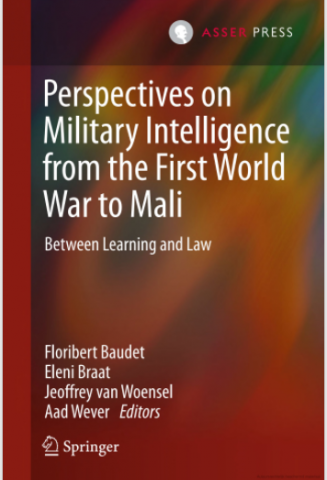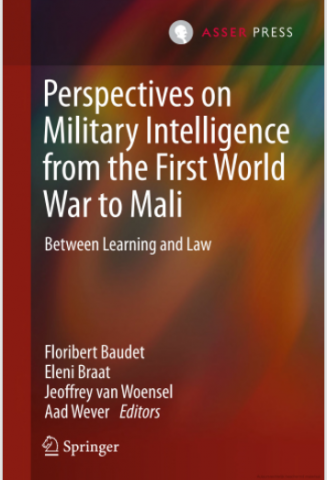Perspectives on Military Intelligence from the First World War to Mali

The book is the result of the conference "Telling the truth to power: the past, present end future of militairy inteliigence" organised by NISA in cooperation with the Netherlands Defense and Inteliigence and Security Service (DISS) in september 2014.
Editors: Floribert Baudet, Eleni Braat, Jeoffrey van Woensel and Aad Wever
Many intelligence practitioners feel that the statutory footing on which intelligence agencies have been placed forms an impediment to confronting unprecedented contemporary challenges. On the basis of case studies spanning the period from the First World War to the present, this book argues that while the intelligence community in the era of globalization has indeed come to face new and complex challenges that require adaptation,operating in demanding and changing environments is not new at all. This book questions the conventional wisdom of 9/11 or the end of the Cold War as caesurae. It also argues that the ability to adapt, innovate, question and learn from past experience is crucial for the success of intelligence organizations, rather than ever-expanding funding.
Agencies’ ability to reflect, adapt and learn from experience determines their subsequent capability to deliver. One key development resulting from globalization is the marked increase in cooperation between intelligence agencies of different countries on the one hand, and between investigative agencies and intelligence agencies on the other. This has led to concerns over human rights and privacy and to increased calls for accountability and improved oversight as the increase in cooperation between organizations operating globally also provides scope for the circumvention of domestic restrictions.
This book proposes an instrument to assess the effectiveness of existing accountability arrangements and offers new insights into the role of (military) intelligence in anumber of crises, e.g., the 1962 Cold War confrontation over Western New Guinea, and the functioning of intelligence in peacekeeping operations ranging from Srebrenica to Mali.
Thematically comprehensive, it offers a mixture of historical, legal, operational, and policy aspects, analyzed through the lens of institutional learning, bringing together academic and practitioners’ perspectives. The focus lies not only on the familiar Anglo-Saxon experiencebut also on cases from India, the Netherlands, South East Asia, Bosnia, Lebanon, and Mali.
The book is aimed at both scholars and practitioners studying and/or working in the field of civil and military intelligence, and those involved in international relations and international humanitarian law/human rights law. It brings together contributions from authors who spoke at the Conference to commemorate the 100th anniversary of the Dutch Military Intelligence and Security Service, organized by the Netherlands Intelligence Studies Association(NISA), and from a number of authors who were specifically invited to participate.
Contents:
1 Military Intelligence: From Telling Truth to Power to Bewilderment? Floribert Baudet, Eleni Braat, Jeoffrey van Woensel and Aad Wever
2 ‘Espionage Is Practised Here on a Vast Scale’. The Neutral Netherlands, 1914–1940 Wim Klinkert
3 Intelligence and the Sino-Indian War of 1962 Prem Mahadevan
4 Western Intelligence and Covert Soviet Military Aid to Indonesia During the 1962 West New Guinea Crisis David Easter
5 Postmodern Intelligence: Strategic Warning and Crisis Management Chong Guan Kwa
6 The Revolution in Intelligence Affairs: Problem Solved? Minne Boelens
7 Blindfolded in the Dark. The Intelligence Position of Dutchbat in the Srebrenica Safe Area Cees Wiebes, Jeoffrey van Woensel and Aad Wever
8 Achieving Understanding in Contemporary UN Peace Operations: The Joint Mission Analysis Centre Reynaud Theunens
9 The Evolution of Peacekeeping Intelligence: The UN’s Laboratory in Mali Sebastiaan Rietjens and A. Walter Dorn
10 Intelligence Accountability in a Globalizing World. Towards an Instrument of Measuring Effectiveness Eleni Braat and Floribert Baudet


